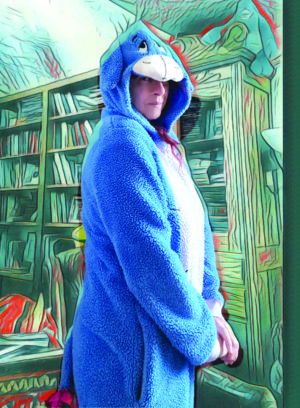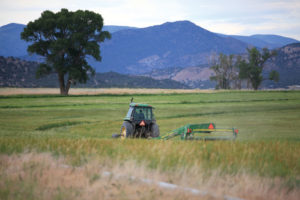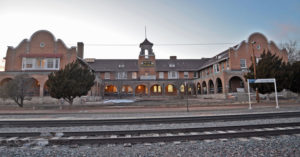By Peter Anderson
“Dad, I’m scared,” my oldest daughter said, and she had good reason to be. We were going on our second hour of being stranded in a ground blizzard on the shoulder of Highway 285, out in the middle of South Park. Seventy mile an hour winds were rocking her little Subaru. It was scary but not nearly as scary as it had been trying to navigate in a whiteout. Were we still in our lane? Where was the shoulder? Were we getting crossways and about to drive into a ditch? Might we end up in the path of a northbound semi? We rolled to a full stop and I opened my door to see if could determine where the edge of the road was so that we could park safely off to the side. A gust of wind ripped the door from my grasp and it was all I could do to pull it shut.
Finally, we were able to orient ourselves, pulling up behind another stranded car. We weren’t in any immediate danger, but the wind was blowing snow through a crack in the seal, depositing a mini-drift on the inside corner of the passenger side window. I imagined it getting bigger and bigger. Fortunately, we had a full tank of gas. We left the engine running to generate a little heat – less and less as the day wore on it seemed – but heat nonetheless. My youngest daughter had burrowed into a sleeping bag in the back seat and was entertaining herself with movies on her phone. My oldest daughter and I wrapped ourselves in some reasonably warm layers and maintained our vigil in the front. I confess that the bunwarmer, which I had cranked to the max in my seat, no longer seemed like the bourgeois device I had always thought it was.
“Our job is to stay put and stay warm. That’s all we can do right now,” I said. “The wind will let up eventually.” But the word “eventually” carried a lot freight. What did it mean? Two hours from now? After dark? After midnight? Tomorrow morning? How long would we be able to generate heat from the engine? And after that? It was three o’ clock. A wind advisory, we were able to determine, ran till 6 p.m. So we just sat tight, listening to her playlist and hoping for the best.
Periodically, the windshield would ice up to the point that we couldn’t see out. We busied ourselves with the project of preserving our ever-shrinking view of the outside world. I had broken and disposed of the windshield scraper earlier in the day – Doh! – trying to de-ice before we left Arvada. All that we had for the job was a plastic CD case. Occasionally, through whatever opening in our windshield glacier we were able to chip away, a break in the snow cloud revealed a plow driver parked twenty or thirty feet ahead of us in the oncoming lane. No one was going anywhere, not even the plow guy, but we were glad he was part of our frozen convoy.
Six o’clock came and went but the wind didn’t know that. Then, sometime around seven, it began to let up. Visibility was improving, we thought, but only in small increments. And then, we noticed some movement through the ice on the driver’s side window. A truck was edging forward in the southbound lane (by that time, there were no worries about oncoming traffic), following the snowplow guy who had also started moving. “See if you can pull in behind that Silverado,” I told my daughter, and 10-4, Rubber Ducky, we soon had us a convoy, moving slowly, but moving nonetheless.
Turned out we were only able to get as far as an isolated fire station to the south of the highway near Como, where we would be marooned for the rest of the night, but so what? We had lights. We had heat. And after we emptied our cars of whatever provisions we were carrying, we had an impromptu post-Thanksgiving potluck. Later the good people of Fairplay somehow managed to deliver some hot cooked meals. Someone broke out a twelve pack of beer. By the time a gust of wind took down a flagpole outside of the fire station, we were happily settled in for the night and able to reflect on our good fortune. As in any emergency, the first responders, in this case the volunteer firemen of South Park, deserved our unending thanks, having led our convoy out of harm’s way. My youngest, who had been wrapped up in murder mysteries all day, amused herself by imagining that someone in our temporary firehouse community would turn out to be a serial killer. Fortunately, the better side of humanity prevailed. It was reassuring to spend the evening in a room full of strangers sharing food and drink, telling tales about our collective misadventure, and appreciating one another’s company.
Peter Anderson recently retired from teaching in order to become a full-time word wrangler. He lives in Crestone.



